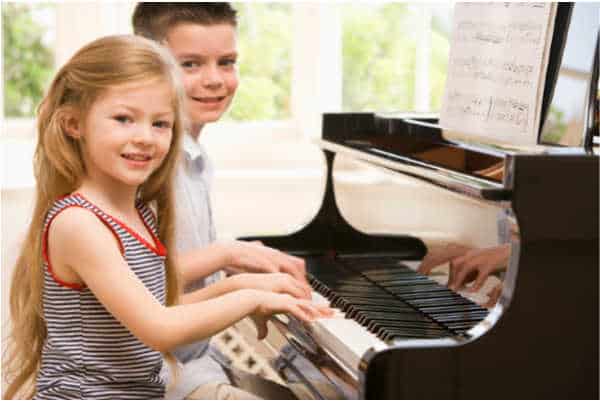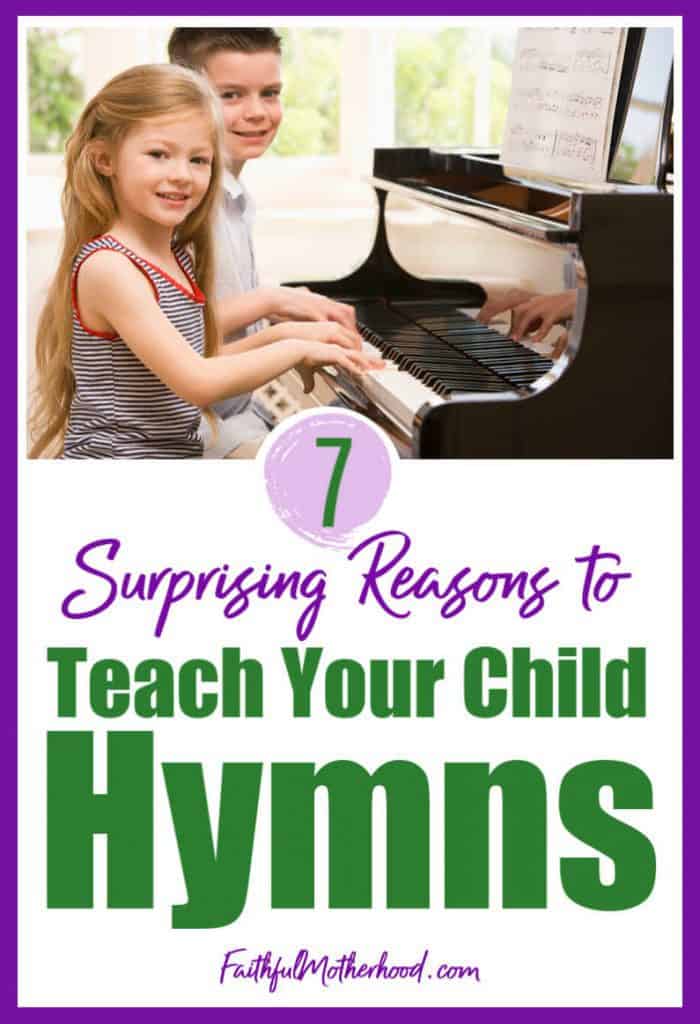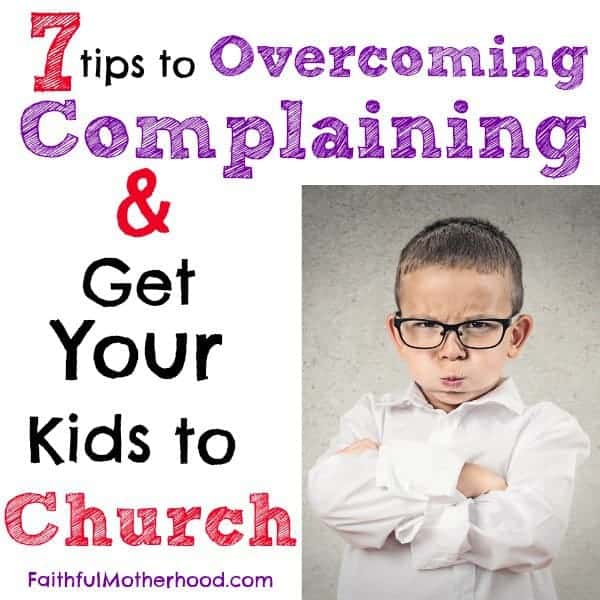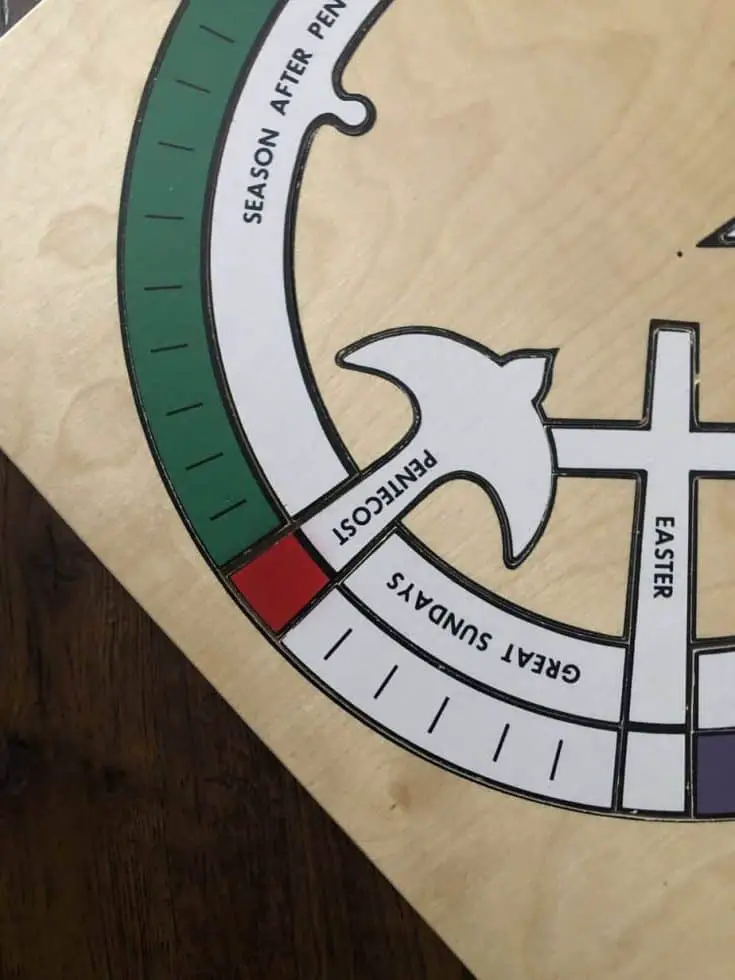Do you teach your child hymns? Singing is an important part of our worship experience as Christians.
Worship includes many elements of prayer, Bible reading, teaching, and music. For many, the music is vital in opening their hearts to connect with God during the service.
As Christian parents, we need to teach our children how to worship. If you go to a church that sings hymns, you need to intentionally teach your child hymns.
If you don’t go to a church that sings hymns, you need to intentionally teach your child hymns. Here are seven reasons why.

#1 Teach Your Child Hymns To Learn A New Worship Language
There are different worship languages. If you have an opportunity to visit different types of churches, you will encounter a unique worship experience at each church.
There are some physical differences that we will see in worship. There will be different types of seating, for example, chairs versus pews. There will be different shapes of rooms, decoration, layout, and smells.
The music will be unique as well. Are there instruments or not? What types of instruments? An organ, a piano, a band?
The “recent” divide in churches between traditional and contemporary is hardly new. Church members have divided over music for generations.
Teach your child to observe these differences and think about what shaped them. This observation will also help them realize that they are used to a particular worship language.
This can be an eye-opening experience to understand that not everyone worships the same way that you do.
We tend to learn how to enter into worship in just one way. The experience of worshipping in a church different from one’s own – helps us to learn how to worship God in new ways.
Instead of being led into worship, we have to consciously take ownership to seek God in worship. This stretching and intentionality actually help us to be more focused in our time of worship.
#2 Teach Your Child Hymns As Cross-cultural Training/Missionary Preparation
How we worship is influenced by our culture. Each congregation has a unique history that shapes what it does and does not do in worship.
People that are reserved in everyday life are more likely to gravitate toward a more reserved worship style. The influence of culture can be more easily seen in congregations that serve distinctive ethnic groups – yet it is there in the history of every congregation.
Are your children going to sing hymns in another culture? They might be more than likely they will not.
So, what is the benefit? Hymns are cross-cultural to our current culture.
By singing hymns, our children can step into another culture while still using the same language that they know. The tunes are not modern tunes.
The layout of the songs with multiple verses is not a part of our modern culture. They are stretching themselves beyond what is popular or their personal preference to worship.
#3 Teach Your Child Hymns To Participate In Multi-Generational Worship
Often the biggest impediments to having many generations of Christians worshipping together is the style of music.
How sad it is that the body of Christ is broken over the style of worship music. Stubbornness and pride are to be found in both camps.
Teaching our children to understand and appreciate hymns can help them be compassionate and thoughtful bridge builders.
#4 Teach Your Child Hymns So They Will Choose A Church Based On Theology, Not On The Music Style
It can be hard to find the right church. You might find a church that still believes the Bible is true, but they are lukewarm or plagued by unhealthy conflict. Finding a healthy church can be very challenging.
There are other theological hurdles too. Do you believe in immersion or infant baptism? How about the frequency of communion? Should the congregation govern itself or have the accountability of an authority structure?
There are more theological distinctions that could be listed that have split churches and birthed all of the denominations that we see today.
With the number of healthy churches shrinking, do we want our children adding worship style to that list in choosing a church? Yet, that is how many Christians choose their church with the type of worship music top on the list.
Many feel passionate about some of the distinctions listed above due to interpretations of the Bible. Yet, scripture does not preference our type of singing only that we should sing.
Teaching our children hymns takes worship style off of their discernment list in choosing a church when they grow up.
#5 Teach Our Children Hymns To Connect Them With Church History
Most hymns have an author and/or a date at the bottom. At some point, a Christian sat down to write that hymn to express a theological truth or conviction. They want to give testimony to who God is and what He was doing.
Amazing Grace is a very well-known hymn written by John Newton in 1779. Newton was a sailor and served on several ships that carried slaves.
Later, he worked on behalf of ending slavery. Learning about his life can be a wonderful foundation for conversations about social justice and how Christians have dealt with slavery.
Swing Low, Sweet Chariot is an African- American spiritual included in many hymnals. The song was originally sung by enslaved African- Americans both for worship and for secret messaging on the Underground Railroad.
How did these men and women keep their faith in Christ despite the sinfulness of others who claimed to be Christian? What can we learn from them as we sing their words today?

#6 Teach Your Children To Learn Hymns For The Poetry And The Theology
We don’t always have to sing hymns to help our children understand them and appreciate them. Many older hymns were first written as poetry or prayers and then later set to music.
One of my favorite songs leading up to Christmas is “Let All Mortal Flesh Keep Silence.” It is a 17th-century French carol that is somber and gray. It focuses on the divine and holy nature of Christ.
The words call Christians to remember that Christ was born with the cross in mind. The words were written in the 4th century by St. James the Less, the first Bishop of Jerusalem.
That is a long time ago! Even just reciting hymns such as this as poetry help to connect us with the centuries of Christians that have worshipped Christ.
Many hymns are rich in theology. We have to stop and explain the meanings of the words and phrases for our children and ourselves to understand the richness.
Holy, Holy, Holy! Lord God Almighty! is one of the hymns that my children have memorized. It is a great example of how we need to slow down and make sure that our children can pronounce the words.
What exactly are cherubim and seraphim? Each stanza is emphasizing a spiritual truth. Can your child identify it and explain why it is important?
#7 Teaching Your Child Hymns Is An Intentional Way To Teach Worship
We must teach our children how to worship. We expose our children to worship in our services and model worship for them, but sadly for many young people, this is not enough.
Just like we break down the steps for prayer and teach our children different models of prayer, so too do we need to teach them to worship. They need to be taught that a worship service is not about entertainment and waiting for God to come to them.
Instead, worship is the work of the people. We meet God because we are reaching out to Him.
We are focusing our hearts and minds on being present and open at that moment –be that with hymns, choruses, chants, or silence.
Most Importantly, Teach Your Child How to Worship
Even those of us who grew up with hymns have often taken them for granted. Even if we do not sing them, we would be blessed to use their rich theology has devotions, prayer, or poetry memorization with our children.
Our goal is to cultivate a connection with the larger body of Christ and an ability to worship with all our brothers and sisters in Christ.
I challenge you to read through your church’s hymnal. Reflect on the rich theology and poetry. We don’t have to sing, to join our voices together with the saints that have gone before us.
What hymn is your favorite to teach children and youth?
Related Posts:

The voice behind FaithfulMotherhood.com is Jyn. She is a veteran homeschool mom of three. More than just a pastor’s wife, she holds a Master of Divinity degree and has served in church leadership for over 20 years. Her passion is equipping parents to live out their calling as the number one faith influencer for their children. She longs to see moms empowered by God’s Word and transferring that love to their children through daily Bible study and family devotions.











